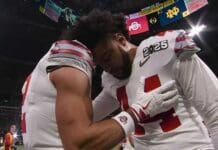Unity in the church is important. But so is not compromising the truth. Francis Chan wants to know: How do Christians pursue unity without compromising the essential doctrines of Christianity? And how do we determine exactly what those are? When he posed these questions to Bible Answer Man Hank Hanegraaff and Gospel for Asia Founder K.P. Yohannan, the two men gave Chan an answer he did not expect: Humility is key.
“One day,” said Yohannan, “I said, ‘God, please help me to understand, is there a key to this whole Bible?’ And all I could hear, like the bell going off, was one word: humility, humility, humility. And I’m not a Charismatic.” It was partly through this experience that Yohannan learned that humility is essential to understanding the truths presented in Scripture. He said, “The real place of learning the mysteries of God is becoming nothing.”
How Do We Pursue Unity in the Church Well?
“In the U.S. right now,” said Francis Chan, “everyone creates their own parameters [for defining biblical truth]. And it’s splintering the church more and more and more.” People follow different leaders because the leaders are gifted or have charismatic personalities. “It’s almost a popularity contest,” he said.
Because influential people can gain followers while saying whatever they want, there is a variety of “theologies” thwarting unity in the church by presenting different views on any number of topics, such as sexuality, divorce and remarriage, and the Eucharist. This seems strange to Chan given that for 1,500 years the church was unified in its position on these issues. “This is ridiculous,” he said, “this can’t be the way.”
Chan is not simply pointing his finger at other leaders for creating problems with unity in the church, nor does he assume that people promoting wrong doctrines are doing so because they have bad motives. Chan said that he himself is guilty of coming to wrong conclusions about Christianity and promoting them without considering the teachings of the early church or seeking accountability from other believers.
When he looks back at his own life and sees times when he promoted wrong ideas, Chan believes that he was sincerely pursuing Jesus during those times. He had a true love for God when he trusted him in high school, and of his later time in seminary he said, “I really believed coming out of seminary that I was fighting for God.”
In seminary, Chan was taught a particular theology and that other theologies were “off.” He now realizes that he had a loyalty to a certain tradition because he came to know Jesus through that tradition. But that does not mean everything in that doctrinal system is correct.
How then can we know what is correct? When Chan became a believer in Jesus, he was taught that if he wanted to know the truth, the foolproof method was to study Scripture for himself. But what happens when multiple individuals study Scripture for themselves and all of them arrive at different conclusions? Isn’t it arrogant for each person to assume that he or she must be the one who is right? “After a while,” said Chan, “you start going, okay, so who arrives at truth? Is it the guy that’s most intelligent? Is it the person that’s closest to God? Because everyone’s getting alone in their office and coming to different views.”
Hanegraaff agreed that studying Scripture for oneself is important, but added that the church, the body of Christ, is an essential part of how people arrive at true doctrine. “I cannot come up with an interpretation that stands in opposition to that which God has mediated through his body by the precious Holy Spirit,” he said.
Chan nodded and responded, “That was a new thought to me, believe it or not.” Previously, he had always thought that what Hanegraaff was describing was trusting in tradition instead of God’s Word. “I had no thought of being saved into the church,” said Chan. “It was about me seeing a message from the Scripture about how I could go to heaven.”
But Chan began to see some inconsistencies in this way of thinking. For example, sometimes a person will leave Chan’s church because Chan and the elders have confronted him about sin in his life. When that happens, it seems arrogant to Chan that the person would think he knows better than his pastor and all the elders combined. “But then it hit me,” said Chan, “‘Do I do that with the early church fathers?’” In other words, if Chan were to study Scripture on his own and come to a conclusion different from the early church fathers, would it not be arrogant for him to assume he must be right?














